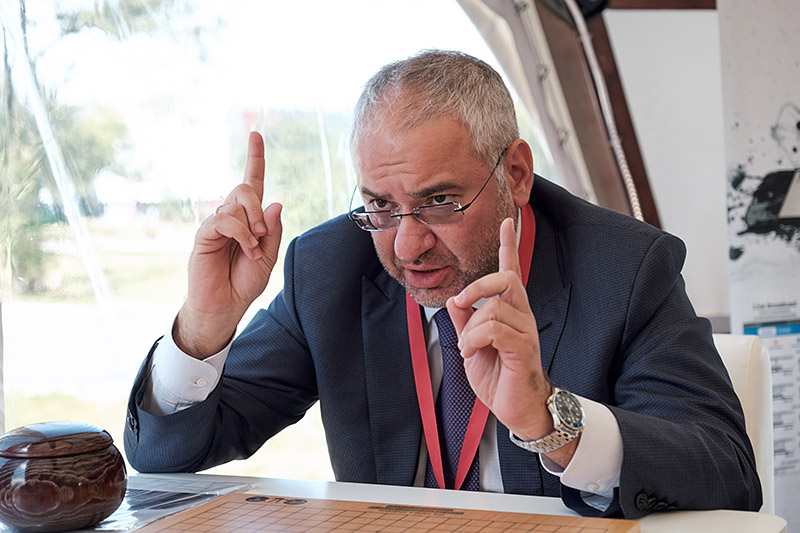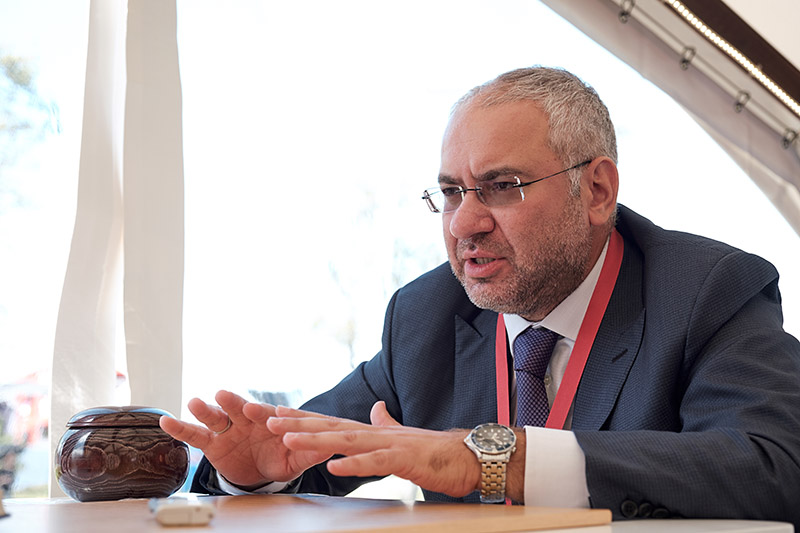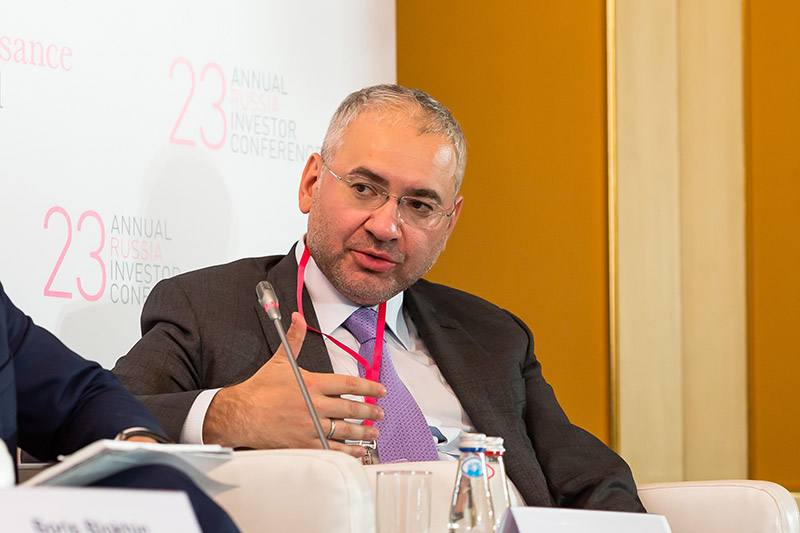[Dialogue] ‘Connection between Go and decision-making in business is a non-linear one’

Vitaliy Nesis, a Head of the supervisory board of the Russian Go Federation and CEO of “Polymetal”. Photo: Polymetal's press service.
The World Amateur Go Championship (WAGC), which will be held in the city of Vladivostok in 2020, is one of the high-profile events of the year. On the eve of the competition, the press service of the championship interviews the key-note “Go people” in Russia. With the permission of the press service, Pan Pacific Agency publishes the first interview of the series. Vitaliy Nesis, a Head of the supervisory board of the Russian Go Federation and CEO of “Polymetal”, told Mikhail Yemelyanov, the 41st WAGC Director, what role does the ancient oriental game Go plays in his life and business.
You are probably one of the most interesting of our “Go people” because you’ve been learning Go since you were a kid. That’s quite rare for an adult from the world of business or politics. They usually learn about Go at a more mature age. I know that your family’s chess traditions go a long way back. I’ve seen a chess board in your office and I know you can play well. So can you tell us what attracted you in Go when you were a child?
There are several fairly strong chess players in our family. My uncle, Gennady Nesis, is an international grandmaster. So naturally my dad taught me how to play at an early age and he was preparing me to be as strong as him. For some reason chess never really appealed to me. I took part in tournaments when I was in primary school and I definitely made some progress.
When I learned about Go, that was quite a lucky coincidence. In the city where I was living at the time, in Kaliningrad, there was a local TV show hosted by Alexander Filatov, who was the president of the Russian Go Federation at the time. He taught me how to play Go, and right from the start, from the first few training exercises and games played on smaller boards, I realized that Go was a much more suitable game for me, both in terms of temperament and enjoying the process rather than the result.
I kept playing chess as well and I still do to this day, not in tournaments of course. Every time I have a short spell when I can play chess and Go, it becomes clear to me again and again that chess is not really my cup of tea and Go is my type of game. I keep a chess set in my office more as tribute to the family tradition.
You participated in Go tournaments when you were a student. You had an actual Go player career. What was it like?
Yes, after I came to Saint Petersburg to study, I started taking part in tournaments. I even took part in the Russian Championship in 1994 held in Nizhniy Novgorod, which was probably the climax of my Go career as a tournament player. I got a decent result for my level, for a guy who came from a smaller city. After that I went to the US to study and that put my Go playing on pause for a few years. Otherwise I think I would have reached 1-2 dan level, I had enough skill for that.
Do you play Go often these days?
I play sporadically, in short “bursts”, so to speak. When I find myself in a place with lots of Go boards and many people who are playing the game, like for example at the Eastern Economic Forum, I try to play as much as I can. Outside of this sort of events it doesn’t happen very often. Some of the company’s employees can play too, some even have Go sets in their offices. So occasionally it might allow for a quick game during a business trip.
We’ll get back to the employees later. Now since we’ve started talking about the company, I have a personal question to ask. Does Go help you in your business decision-making process? I know you get this question a lot, but it’s always very interesting because everyone is always curious about one thing: “How can Go help me personally? Why should I study this smart ancient game?”
Surely the connection between Go and decision-making in business is a non-linear one. We can’t suppose that a game position will fully reflect a business situation. But I’m sure that Go forms a specific attitude toward standard, recurrent business problems and management tasks. Key strategic concepts of the game can be applied very naturally to life situations.
So of course my answer is yes, understanding of the spirit of Go really helps me in my professional activities. The way I build relationships with people both inside and outside of the company, the way I make decisions, maybe the way I try to influence our corporate culture, in the end all of these things are rooted in Go.

Your company has been the main sponsor of the Russian Go Federation for a number of years now and you invest a lot not just in the Federation itself but in Go development in different regions, especially remote ones like Yakutia, Magadan, Primorsky Krai, Khabarovsk. Do you have a dream of making Go a part of our education system to be put into school curricula? And how do you see the prospect of bringing Go into the sphere of education?
If we’re talking about my personal aspirations, of course I follow the news of Go as a sport but my personal goal is its general popularity. I think the main goal of the Russian Go Federation and many Go enthusiasts should be spreading the game to all layers of the population. In that respect education system is a perfect tool for introducing Go and attracting people to start learning it afterward.
The results that we received in Magadan is a pleasant surprise for me. I have no doubt that Go has a beneficial effect on intellectual and psychological children’s development. However it was quite surprising to me that after such a short experiment period they received objective and measurable results. So I think it would be very beneficial if the game of Go gained popularity in our country. Of course I don’t advocate putting Go boards in every classroom.
But taking into account that there is a tendency for Russia to start turning more and more in the direction of our Asian neighbors, the East, and China is starting to play a very important role in modern geopolitics, we certainly need lots of people, lots of Russian citizens, who understand not only classical Western philosophy or classical Western “chess” mentality but who also understand Eastern, Chinese, Japanese, Korean mentalities which have a strong connection with Go philosophy.
Our company works a lot with our Eastern and Asian partners and I can say that some of our talented and very professional employees sometimes encounter considerable difficulties simply because they can’t understand the psychology of our Asian partners. And Go is the tool that helps overcome this barrier. In terms of our country, in view of ever growing scope of business communication with the Asian partners, naturally our country needs hundreds, thousands or rather tens of thousands of people who speak the same language with the Chinese, the Japanese and Koreans.
That’s a powerful story!
I truly believe in this! I must say that I only fully realized this when I seriously started doing business, primarily with China. I’ve always been a Go fan and I’ve always thought that there are some universal strategic concepts that are applicable in any business field.
When we started doing business with China, I realized how difficult it was. After an analysis I realized that the difficulties lay primarily in our difference in approach toward solving “game tasks”. Business is essentially a form of game where everybody wants to win. When interacting with Europeans or Americans classical chess concepts like “gambit” or “winning the exchange” are quite useful. But all of that is completely inapplicable when interacting with Asian people.
So we have to start thinking in terms of different concepts like “aji” or “firikawari”. I sincerely believe in this,it’s not just my attitude but my firm belief that in this modern world Russia needs people who can play Go and understand the game well.
Going back to your business, I know that there is a corporate Go club in your company. These days many companies implement Go in their corporate culture, such companies exist in China for example. In Russia that’s a fairly new concept. I can tell you that Rostelecom and Yandex, those IT companies have their own clubs. In Polymetal as well, Go seems to be connected with artificial intelligence and high tech, resource economy seems to be far from it. But we understand (I read this in your interview too) that every sphere now needs out-of-the-box decisions and an ability to think outside the box. So the question is: do you see any implicit benefits of teaching Go to your employees? Are they afraid of playing with you since you are their boss?
I lose to my employees regularly on the Go board, though it probably happens more often in handicap games. So no, of course they are not afraid of playing with me. To make Go a part of corporate culture requires a lot of time. That’s probably wishful thinking on my part but I’ve noted several times that after some employees start learning Go seriously, their way of looking at things changes. They change their attitude toward risk-taking or rather the way they manage risks. As a medium-term goal, it won’t take a year or two, it will be 5-10 years. It shouldn’t be forced in any way but it should come as a movement from below.
And yes, I hope the corporate culture will change a little. It will become less rigid when making decisions, less formulaic, more creative. Of course we can hardly hope that people who started playing Go when they were adults can rearrange their way of thinking significantly. But those kids from Magadan who will come to work for us in 10 years as young professionals, it’s them that I have high hopes for.
That’s a very interesting long-term plan.
Well, it’s Go we’re talking about!

The World Championship will be held in Vladivostok in 2020. It’s a unique event and it is coming to our country for the first time in history. What expectations do you have? Will you take part in the match between politicians and entrepreneurs that we are planning to hold?
I’ll start with the easier question. I will definitely take part in that match. Actually I just played a game with a member of the Chinese business delegation at the Eastern Economic Forum, alas not very successfully, so I should try to get revenge. As for my expectations, I don’t expect any drastic changes in people’s attitude toward Go in our country, nor a sudden surge of interest. In my opinion it’s one of the key steps in the right direction. In general the order of actions of the Russian Go Federation is directed at strengthening the image of Go in our country, gradual but consistent spreading of knowledge about the game and in the end, going back to your previous questions, it should result in increasing popularity.
I really hope for maximum participation, not just from the people who are coming to the festival itself in Vladivostok. We must provide abundant media coverage of the event. It’s important that many opinion leaders take part in it, including politicians, public figures, athletes from more popular sports.
So two years from now when I’m having a conversation with a Governor, a Minister or an important businessman and I would tell him that I am Head of the Board of Trustees of the Russian Go Federation, I hope the first question they ask me won’t be: “What is Go?”. That’s what I mostly expect from this Championship. Unfortunately now in 80% of cases people either know nothing or have a very vague idea about it. I think if we are planning to increase popularity, we have to start with eliminating this ignorance in the elites. I think this is one of the key tasks that this event is trying to accomplish.
Yes, that is a very important task indeed. We have to introduce Go not only to a wide range of people, who can start playing right away, but to decision-makers as well. Without their support it is difficult to expect big changes. Lastly, a somewhat traditional question. Hundreds of Go enthusiasts will come to the festival, I don’t mean only from Russia, I think many Go fans from around the world are coming as well. Is there anything you’d like yo say to them? Any wishes?
The general wish is to try and feel the spirit of the game. For every level of familiarity the optimal experience is probably different. To those who can play Go, I would sincerely recommend playing with people from different countries. Because this way you can feel the style, the temperament, you can even make some conclusions about the national character if you play longer. If you are a beginner, try watching other people play, try guessing how the game will develop. And if you are a complete beginner or you don’t know what Go is, don’t feel embarrassed to ask for a lesson, look at the board and take the stones for the first time.
I think that apart from the sport-related or the philosophical aspects, Go has a very deep aspect of intercultural dialog. So besides spreading information about the game inside Russia, I consider this Championship to be a great possibility to have a meaningful, constructive and friendly conversation with people from different cultures and civilizations.